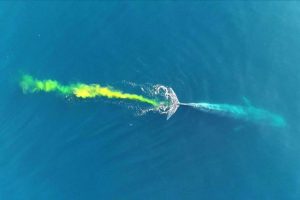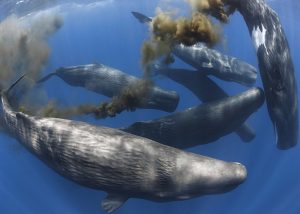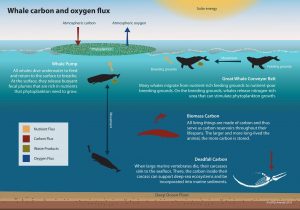The Rugvin Foundation is putting all whales on the world map as marine engineers! These marine mammals make an important contribution, perhaps the most important, to the conservation of biodiversity and they are also absolutely essential for climate protection. Unfortunately, the reality is that we as humans do not know a lot about this and consequently don’t take advantage of this knowledge. Monday, October 19th the first Whale Poo Ambassadors meeting took place.
In the fight against climate change, the seas around us are filled with windmills, trees are planted on land, and subsidies for electric cars and PV panels usually run out quickly. We forget that all around us thousands of “engineers” are busy controlling the climate and biodiversity already for centuries. One of the most important facts here is that the whale poo, the feces of the whales is fertilizing the phytoplankton.

A blue whale producing whale poo at the surface (Photo: Ian Wiese)
Without this plankton (algae and seaweed), no carbon dioxide, CO2, is being absorbed from the air and no oxygen is produced. This dung of most whales floats on the surface of the sea, where this plankton lives and where the sun is shining! So here are the perfect growing circumstances. The whale poo contains essential minerals (Fe / iron, N / nitrogen, etc.) that are vital for the growth of this plankton. And without this vegetable plankton (the phytoplankton), no animal plankton (the zooplankton) and no fish, etc. This is just one process the larger whales are responsible for, but a very important one, hence our name: the Whale Poo Ambassadors! Our professionals, along with students and volunteers and the help of American scientists, have started describing all known whale processes.
Consider hereby as well the “whale pump” (the whale pump, the vertical movements that whales make in the water and promote mixing of water layers), the migrating whales from polar waters to more temperate climate waters, producing poo on their way, and the fertilization of coral reefs by dolphins, etc. At the same time, we see from NASA satellite images that the oceans become bluer and less green. In other words, less phytoplankton and less biodiversity. We are also quantifying those processes, for example how much CO2 will one be saved by one whale? And how many hectares of newly planted trees does this correspond to? How much herring does a Humpback whale yield? Etc. What are the financial benefits of a whale? A lot is already known, but the knowledge has often been described as one separate or a few pieces of the puzzle together.
As Whale Poo Ambassadors, with the help of American scientists and other organizations, we will look for those puzzle pieces and will put the puzzle and communicate about it! Because the latter is also essential!

Sperm whales producing whale poo
Every now and then, news about this trickles out through the media. As recently reported in the NOS about the humpback whales. But the report “Nature’s solution to climate change” from the International Monetary Fund (IMF) last December was, unfortunately, a good day after its release from the news. See also our Dutch page about marine ecological engineers. We will regularly come out with the descriptions of one or more puzzle pieces here on this website with new webpages, write press releases, organize workshops, courses, and lectures, etc. and we have another package of ideas for which we can use financial support. Sharing our posts is always highly appreciated!




